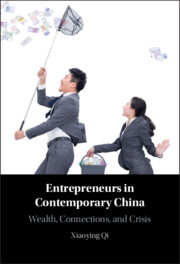Book contents
- Entrepreneurs in Contemporary China
- Entrepreneurs in Contemporary China
- Copyright page
- Dedication
- Contents
- Acknowledgements
- Introduction
- 1 E-Commerce
- 2 Making Social Networks
- 3 Trust, Broken Trust, and Trust Renegotiated
- 4 Family Business and Its Management
- 5 Female Entrepreneurs
- 6 Crisis as Opportunities
- Conclusion
- Appendix
- References
- Index
6 - Crisis as Opportunities
The Chinese Practice of Weiji
Published online by Cambridge University Press: 24 August 2023
- Entrepreneurs in Contemporary China
- Entrepreneurs in Contemporary China
- Copyright page
- Dedication
- Contents
- Acknowledgements
- Introduction
- 1 E-Commerce
- 2 Making Social Networks
- 3 Trust, Broken Trust, and Trust Renegotiated
- 4 Family Business and Its Management
- 5 Female Entrepreneurs
- 6 Crisis as Opportunities
- Conclusion
- Appendix
- References
- Index
Summary
Theoretical suppositions of business crisis in the literature are largely drawn from studies conducted in North America and Western Europe. Chapter 6, on the other hand, examines a Chinese approach to crisis. Based on the notion of paradoxical integration, this approach informs not only crisis management in China and East Asia, but potentially has general application. In this conceptualization, crisis is not necessarily treated as a consequence of discord or disruption, but rather is understood as an aspect or phase of an unfolding process, even in the most difficult circumstances. This approach, then, offers a course toward future business success even in the face of significant loss, without suffering desperation or self-destruction. Three strategies which entrepreneurs adopt to crisis are examined in the chapter, namely, the combination of the old with the new, or path dependence; second, seeking facilitating relationships with other members of a business community, or guanxi accommodation; and finally, reordering priorities and available resources, including familial and personal, or self-reflexivity.
Keywords
- Type
- Chapter
- Information
- Entrepreneurs in Contemporary ChinaWealth, Connections, and Crisis, pp. 119 - 142Publisher: Cambridge University PressPrint publication year: 2023

